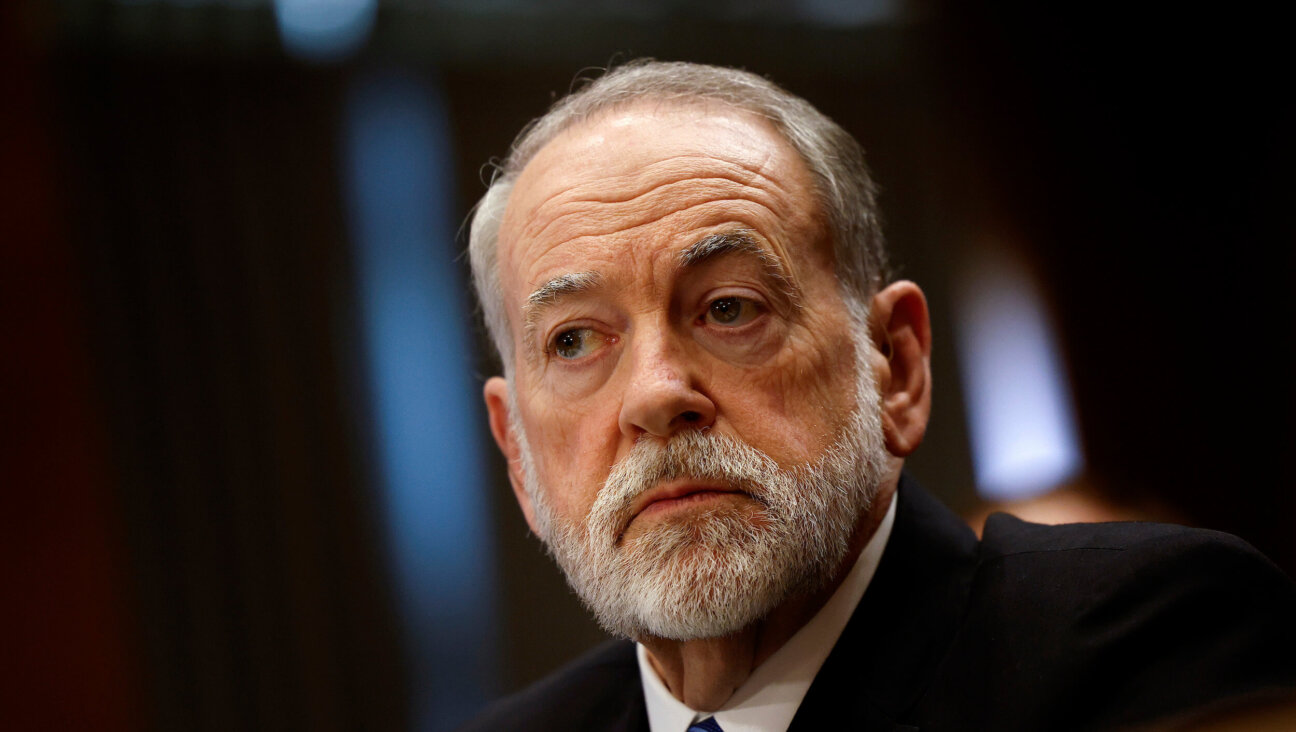I’m A College Student Battling Anti-Semitism. Trump Is Making It Worse.

President Trump at the United Nations. Image by Getty Images
As a college student who regularly encounters anti-Semitism on campus, you might think I’d be happy to see President Trump plan to sign an executive order to protect Jewish students, especially after a misreported rumor was cleared up about the executive order classifying Judaism as a nationality.
You would be wrong.
This executive order is a mistake, and will only make things worse for Jewish students. This order will chill conversations on campuses, when what we need is the exact opposite: more conversations, more discussions, more openness.
Believe me, I know firsthand that anti-Semitism on college campuses is skyrocketing. It’s a nightmare I live every day, along with thousands of other Jewish students in universities and colleges across North America.
Each week, a new story breaks describing a new low: The University of Toronto’s Executive Committee of the Graduate Students’ Union denied a request from Jewish students to have their campus Hillel facilitate an expansion of Kosher food options on campus; the committee said that because Hillel has political and financial ties to Israel, a controversial political body, they would abstain from allowing this effort. At Vassar College, students interrupted an Israeli speaker with screams of “Palestine will be free, from the river to the sea” as he was telling the story of his father being hanged in Iraq by anti-Semites. At McGill University, the Student Union is forcing a Jewish leader to resign if she were to attend a Hillel sponsored trip to Israel and the West Bank. And just a few days ago, a video was captured of a student at Columbus State cutting down an Israeli flag on campus, and then throwing it in the trash, verbally commenting: “Right where you belong.”
Many in the Jewish community are no longer shocked when they hear these stories. We have replaced our shock with discussion and activism. Many of the hypothesized solutions to “the campus problem” seem to be heading in the right direction. I especially like ideas that seek to promote a dialogue among students and address offensive comments in a way that educates rather than attacks. And new initiatives that seek to highlight the Jewish experience for students who may not yet understand our cultural identity are my favorite.
The only way we’re getting out of this is to learn from each other, to educate each other, and to be firm in our beliefs that we are all Americans looking to make our country a more equal and fair place to live.
But Donald Trump’s recent executive order has sent a wrecking ball through any optimism I once had that this was possible. The truth is, rather than protecting us, this executive order will be used to silence students on college campuses.
According to a draft of the order, it would formally call on government departments enforcing Title VI of the Civil Rights Act of 1964 to adopt the International Holocaust Remembrance Alliance definition of antisemitism. It also calls for the enforcement of Title VI against “prohibited forms of discrimination rooted in anti-Semitism as vigorously as against all other forms of discrimination prohibited by Title VI.” And it calls on departments enforcing Title VI to consider “‘Contemporary Examples of Anti-Semitism’ identified by the IHRA, to the extent that any examples might be useful as evidence of discriminatory intent.”
While I personally support the IHRA definition of anti-Semitism, this executive order is a failure. Its goal is to intimidate those on campus who may not see how criticism of Israel can sometimes trespass into anti-Semitic territory — instead of to educate students on Jewish history and our sense of peoplehood.
This should not surprise us. This executive order comes from a divisive president who openly and proudly attacks minorities in this country based on their race or national origin. If I am going to be protected under Title VI and treated as a legitimate minority who faces discrimination in this country, I will accept nothing less for my fellow minorities, be they Latin American, Asian, or Middle Eastern (including Palestinian). I am horrified at the prospect of my precious identity being defined by a blatant racist.
The solution to the problem I and other students are facing is overcoming fear of displaying our Jewish pride, and proudly saying what it means to be Jewish. Supporters of the movement to boycott Israel and members of Students for Justice in Palestine chapters need to hear from Jewish students in community building discussions. They need to hear why the demonization of our self-determination in Israel is anti-Semitic, and why Zionism means freedom and liberation to some people, though it may mean political injustice to others. We need to have conversations about what Israel means for the Jewish people, why it is so important, and why many are offended when violence against its people is encouraged, or when the entire state is called something that it is not.
I want to sit down with those who most despise me for my Zionist identity. I want to educate them on how their words and actions have been egregiously offensive to the Jewish community, and how they can alter their platform so as to not be so extreme. We need to hear from each other as to how to make language more inclusive and less incendiary, and that starts with the grassroots: with students.
President Trump’s executive order does none of that. Instead of emphasizing the culture of Jewish Americans, it separates us from the crowd, and makes our very existence political. Instead of encouraging respectful dialogue, it slams the door on those who may have legitimate grievances with the State of Israel.
Instead of working toward fixing an already fractured community, it further divides not only the American people, but American Jews. All of this done by a president who stood before a conference of Jews this weekend and said that we cannot vote for Elizabeth Warren because of her wealth tax, and claims that some of us simply are not loyal to Israel enough.
Why should we allow ourselves to be “protected” by a man who traffics in anti-Semitism whenever he is given the opportunity?
Please, Mr. President: Sit this one out.
Blake Flayton is a sophomore at George Washington University.






















